Understanding Classic Fine Foods Malaysia in the Context of BCM: A Strategic Guide to Business Continuity Planning
Chapter 7
Classic Fine Foods Malaysia's Operating Environment
Introduction
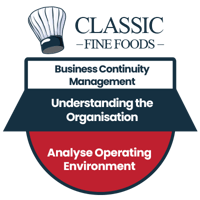 Understanding the operating environment is critical to implementing an effective Business Continuity Management System (BCMS) as per ISO 22301 requirements.
Understanding the operating environment is critical to implementing an effective Business Continuity Management System (BCMS) as per ISO 22301 requirements.
.png?width=200&height=200&name=CFF%20operating%20environment%20(1).png) Classic Fine Food (CFF) Malaysia's operating environment is complex and multifaceted. The company specialises in importing, distributing, and retailing premium gourmet foods.
Classic Fine Food (CFF) Malaysia's operating environment is complex and multifaceted. The company specialises in importing, distributing, and retailing premium gourmet foods.
This chapter explores the internal and external factors influencing CFF Malaysia's operations, the risks and opportunities they present, and how these elements shape the company's BCM strategy.
Internal Operating Environment
Organisational Structure
CFFM operates with a centralised organizational structure. Key functions such as procurement, logistics, sales, and marketing are managed from its headquarters in Kuala Lumpur.
The company also has regional distribution centres and retail outlets across Malaysia.
This structure ensures efficient decision-making but also creates dependencies on central functions, which must be considered in the BCMS.
Workforce
CFF Malaysia employs a diverse workforce, including skilled professionals in supply chain management, sales, customer service, and warehouse and retail staff.
CFF Malaysia’s reliance on human capital means that workforce availability and well-being are critical to maintaining operations.
Training and awareness programs are essential to ensure employees understand their roles in business continuity.
Technology and Infrastructure
CFF Malaysia relies heavily on technology for inventory management, order processing, and customer relationship management.
Its IT infrastructure includes cloud-based systems, which provide flexibility but also introduce cybersecurity and data integrity risks.
Physical infrastructure, such as warehouses and retail outlets, must also be resilient to disruptions.
Supply Chain
CFF Malaysia’s supply chain is a core component of its operations as a distributor of premium gourmet foods.
The company sources products from international suppliers and relies on a network of logistics partners for distribution.
Any disruption in the supply chain, whether due to geopolitical issues, natural disasters, or supplier failures, can significantly impact operations.
External Operating Environment
Market and Industry Trends
The gourmet food industry in Malaysia is highly competitive, with increasing demand for premium and organic products.
To remain competitive, CFF Malaysia must stay attuned to market trends, such as changing consumer preferences and the rise of e-commerce.
These trends also present opportunities for innovation and growth, which should be factored into the BCMS.
Regulatory Environment
CFF Malaysia operates in a regulated environment, with requirements related to food safety, import/export regulations, and labour laws.
Compliance with these regulations is non-negotiable and must be integrated into CFF Malaysia’s BCM Planning.
Regulation changes can also pose risks that need to be monitored and addressed.
Economic Factors
Economic conditions, such as inflation, currency fluctuations, and changes in consumer spending, can impact CFF Malaysia’s profitability and operations.
CFF Malaysia must consider these factors when assessing risks and developing continuity plans.
Geopolitical and Environmental Risks
Malaysia’s geographic location exposes CFF Malaysia to risks such as natural disasters (e.g., floods, earthquakes) and regional geopolitical tensions.
These risks can disrupt supply chains, damage infrastructure, and affect employee safety.
Climate change also poses long-term risks to the availability and cost of certain food products.
Stakeholder Expectations
CFF Malaysia’s stakeholders, including customers, suppliers, investors, and employees, have high expectations for the company’s resilience and ability to deliver quality products consistently.
Meeting these expectations requires a robust BCMS that addresses potential disruptions proactively.
Risk Assessment and Opportunities
Identifying Risks
CFF Malaysia’s operating environment presents a range of risks, including:
-
Supply chain disruptions (e.g., delays, supplier insolvency)
-
Cybersecurity threats and IT system failures
-
Natural disasters and climate-related risks
-
Regulatory changes and compliance challenges
-
Economic volatility and market competition
Identifying Opportunities
While risks are a primary focus of the BCMS, CFF Malaysia can also leverage opportunities to enhance resilience, such as:
-
Diversifying suppliers and logistics partners to reduce dependency on single sources
-
Investing in technology to improve supply chain visibility and efficiency
-
Developing contingency plans for emerging market trends, such as e-commerce
-
Building strong relationships with stakeholders to foster collaboration during disruptions
Integrating the Operating Environment into the BCMS
Context of the Organisation
As required by ISO 22301, CFF Malaysia must define its organisation's context, including the internal and external factors that influence its operations.
This understanding forms the foundation for identifying risks, setting objectives, and developing BCM Strategies.
Business Impact Analysis (BIA)
A thorough Business Impact Analysis (BIA) is essential to assess the potential effects of disruptions on CFF Malaysia’s operations.
The BIA should consider the unique aspects of the company’s operating environment, such as its reliance on international suppliers and the perishable nature of its products.
Risk Assessment and Treatment
CFF Malaysia’s risk assessment process must account for the specific risks and opportunities identified in its operating environment.
Risk treatment plans should prioritise actions that enhance resilience, such as diversifying supply chains, implementing cybersecurity measures, and training employees for crisis management.
Continuous Monitoring and Improvement
The operating environment is dynamic, and CFF Malaysia must continuously monitor changes in internal and external factors.
Regular reviews and updates to the BCMS ensure that the company remains prepared for emerging risks and opportunities.
Summing Up ...
A complex interplay of internal and external factors characterises CFF Malaysia’s operating environment.
By understanding these factors and integrating them into its BCMS, CFF Malaysia can build a resilient organisation capable of withstanding disruptions and seizing growth opportunities.
This chapter underscores the importance of aligning business continuity strategies with the organisation's unique context, as required by ISO 22301, to ensure long-term success and sustainability.
This chapter provides a comprehensive overview of CFF Malaysia, setting the stage for developing a robust business continuity management system in line with ISO 22301 requirements.
This chapter is part 1 of the eBook "Driving Business Continuity: Implementing BCM for Classic Fine Food Malaysia." It is titled "Understanding Classic Fine Foods Malaysia in the Context of BCM: A Strategic Guide to Business Continuity Planning", which provides a comprehensive guide to implementing a BCM system in alignment with ISO 22301
| Driving Business Continuity: Implementing BCM for Classic Fine Food Malaysia | |||
| Understanding CFF Malaysia in the Context of BCM: A Strategic Guide to BCP | |||
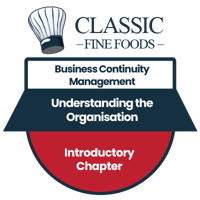 |
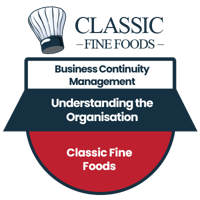 |
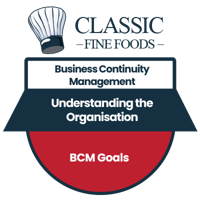 |
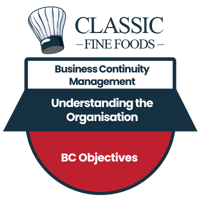 |
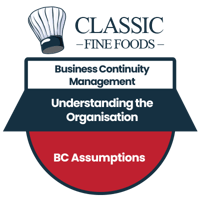 |
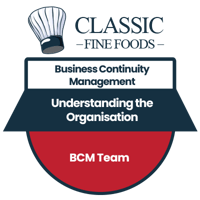 |
 |
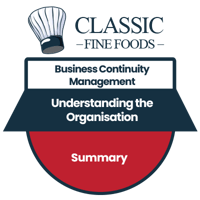 |
More Information About Business Continuity Management Courses
To learn more about the course and schedule, click the buttons below for the BCM-300 Business Continuity Management Implementer [BCM-3] and the BCM-5000 Business Continuity Management Expert Implementer [BCM-5].




![Register [BL-B-3]*](https://blog.bcm-institute.org/hs-fs/hubfs/hub_generated/resized/19a8306f-6b76-45ff-8585-95111f393aeb.png?width=200&height=56&name=19a8306f-6b76-45ff-8585-95111f393aeb.png)



![FAQ [BL-B-3]](https://blog.bcm-institute.org/hs-fs/hubfs/hub_generated/resized/9b7f5669-8ad6-450b-a98f-5f5d49ebfc8e.png?width=150&height=150&name=9b7f5669-8ad6-450b-a98f-5f5d49ebfc8e.png)
![Email to Sales Team [BCM Institute]](https://blog.bcm-institute.org/hs-fs/hubfs/hub_generated/resized/83ae9ad3-affc-416e-8f51-64218d6d98f2.png?width=100&height=100&name=83ae9ad3-affc-416e-8f51-64218d6d98f2.png)





